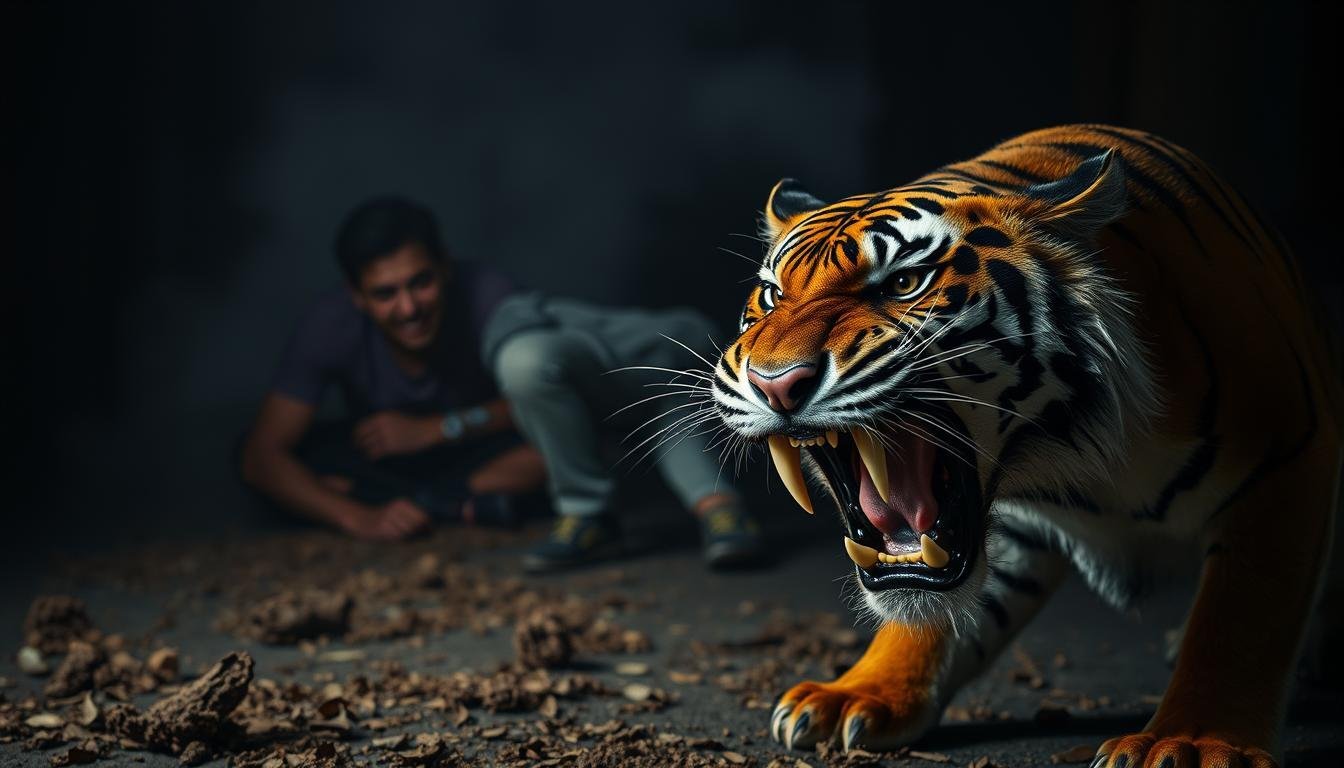Dangers of Exotic Animals: Having an unconventional pet might seem exciting, but it poses serious risks to you and your family. Exotic animals, such as big cats and reptiles, are not domesticated like typical household pets. Their complex needs are challenging to meet in a home environment.
These pets’ behavior can be unpredictable, leading to potential safety hazards. In this article, we will explore the various dangers associated with keeping exotic pets and the risks they pose.
Contents
- 1 What Qualifies as an Exotic Animal?
- 2 Why Are Exotic Animals Dangerous?
- 3 Health Risks Associated with Exotic Pets
- 4 Environmental Concerns of Exotic Pet Ownership
- 5 Legal Implications of Owning Exotic Animals
- 6 The Ethical Dilemma of Exotic Pet Ownership
- 7 Safer Alternatives to Exotic Pet Ownership
- 8 Conclusion: Dangers of Exotic Animals
- 9 FAQ
- 9.1 What is considered an exotic animal?
- 9.2 Why are exotic animals dangerous to keep as pets?
- 9.3 What health risks are associated with exotic pets?
- 9.4 What are the environmental concerns of exotic pet ownership?
- 9.5 Are there any legal implications of owning exotic animals?
- 9.6 What are some safer alternatives to exotic pet ownership?
What Qualifies as an Exotic Animal?
What counts as an exotic animal might surprise you. It covers a broad range of creatures not seen as usual pets.
Big Cats, Primates, and Reptiles
Exotic animals include big cats like lions and tigers, and primates such as monkeys. Also, various reptiles are part of this group. People keep these animals as pets for their uniqueness or as a status symbol.
Exotic Birds and Unusual Mammals
Exotic birds and unusual mammals also fit into this category. Their rarity makes them appealing as pets.
Status Symbol and Uniqueness
Many are attracted to exotic pets for their status or uniqueness. Yet, this attraction can lead to dangerous misconceptions about their needs and behaviors.
Misconceptions About Domestication
There’s a common belief that exotic animals can be domesticated like regular pets. But, these animals keep their wild instincts, posing a danger. It’s important to understand the risks of having exotic animals.
Why Are Exotic Animals Dangerous?
Owning exotic animals can be risky because of their wild instincts. Even if they are kept in captivity, they still have natural behaviors. These can be unpredictable and dangerous.
Territorial Aggression
Exotic animals, like big cats and some reptiles, show territorial aggression. They can become violent if they feel their space is threatened. Territorial aggression is a natural defense mechanism that can cause serious injuries or even fatalities.
Predatory Responses
Some exotic animals are predators and may see humans or other pets as prey. For example, owning a pet snake or a large cat can be dangerous if not handled right. Predatory responses can be triggered by hunger, stress, or instinct.
There have been many cases of exotic animal attacks in the United States. Some examples include:
- A tiger attack in California that seriously injured the owner’s family member.
- A python escape in Florida that resulted in a fatality.
- A monkey attack in New York that left the victim with significant injuries.
Long-term Consequences for Victims
The long-term effects of exotic animal attacks can be severe. Survivors may face physical trauma, psychological distress, or both. In some cases, the trauma can last for years, affecting their quality of life.
Health Risks Associated with Exotic Pets
Exotic pets are tempting, but they come with a hidden danger. They can carry zoonotic diseases. As an owner, you’re not just caring for a unique pet. You’re also risking your health and others.
Salmonella from Reptiles
Reptiles like turtles and snakes can carry Salmonella. This bacterium causes severe stomach illness in humans. Just touching these animals or their homes can lead to infection.
Herpes B from Primates
Primates, such as monkeys, can carry Herpes B. This virus is deadly to humans. It can spread through bites or scratches, making it risky to handle them.
| Disease | Source | Transmission Risk |
|---|---|---|
| Salmonella | Reptiles | Direct contact |
| Herpes B | Primates | Bites, scratches |
Knowing these risks is key for exotic pet owners. It’s not just about the cost or the excitement. It’s about the ongoing health and safety risks.
Environmental Concerns of Exotic Pet Ownership
Exotic pet ownership can harm the environment in big ways. When these pets escape, they can upset local ecosystems. They become invasive species, causing trouble for native wildlife.

In Florida’s Everglades, pythons have wreaked havoc. They’ve hurt native animals, including endangered ones. This shows the dangers of letting exotic pets roam free.
Other Invasive Exotic Pets
Other pets, like some fish and birds, can also damage the environment. They can take over native animals’ homes and even lead to their extinction. It’s important for owners to know how their pets might harm the environment.
Knowing the risks can help you make better choices for your pets. It can also stop invasive species from harming the wild.
Legal Implications of Owning Exotic Animals
Deciding to own an exotic animal comes with legal challenges. You must understand laws and regulations that differ by place.
The Lacey Act and CITES
The Lacey Act is a federal law that bans wildlife, fish, and plant trafficking. It applies to items taken, possessed, or sold illegally. The Convention on International Trade in Endangered Species of Wild Fauna and Flora (CITES) also regulates global trade of endangered species. Owning certain exotic animals might break these laws if they’re protected or trade is restricted.
USDA and CDC Regulations
In the U.S., the U.S. Department of Agriculture (USDA) and the Centers for Disease Control and Prevention (CDC) have rules for exotic animals. Some animals need special permits or licenses. Knowing these rules is key to avoid legal trouble.
Many homeowner’s insurance policies don’t cover damages from exotic animals. You might need a special rider or policy for your exotic pet. Without it, you could face big financial losses if your pet damages something or hurts someone.
Legal Responsibility for Damages
As an exotic pet owner, you’re legally responsible for any damage or injury your pet causes. This includes medical bills, property damage, and more. It’s important to understand your legal duties and take steps to avoid these risks.
The Ethical Dilemma of Exotic Pet Ownership
Thinking about owning an exotic pet brings up many ethical questions. The welfare of these animals is a big concern. Their needs are complex and hard to meet at home.
Inadequate Housing and Care
Many exotic animals need special housing and care that’s hard to find at home. Inadequate housing can cause stress and health issues in these animals.
Psychological Needs of Wild Animals
Exotic animals have psychological needs that are often not met in captivity. Some animals need complex social structures or large spaces to roam. This can lead to behavioral problems when they’re confined.
Smuggling and Black Market Operations
The exotic pet trade is often tied to smuggling and black market operations. This makes owning exotic pets even more complicated. Buying exotic pets can help these illegal activities.
Some key ethical concerns include:
- The inability to provide adequate housing and care for exotic animals.
- The psychological impact on animals due to captivity.
- The potential support of smuggling and black market operations through the purchase of exotic pets.
It’s important to think deeply about the ethics of owning exotic pets. Making sure the welfare of these animals is a top priority is crucial.
Safer Alternatives to Exotic Pet Ownership
Having an exotic pet can be a big responsibility. But, there are safer ways to get something unique. If you want an exotic pet, look at alternatives that are safer.
Consider domestic breeds that look like exotic animals. For instance, Bengal and Savannah cats are hybrids. They mix wild cat looks with domestic pet behavior.
Bengal and Savannah Cats
These cats have cool coats and lots of energy. They’re perfect for owners who want a special pet.
Specialized Reptile Breeds
Look into specialized reptile breeds made for home life. They’re as interesting as wild animals.
Or, you can support exotic animals without owning one. Sponsorship programs help animals in sanctuaries and conservation centers.
Sponsorship Programs
- Help with animal care costs
- Get updates and photos of your animal
- Support conservation efforts
Volunteering at Sanctuaries
Volunteering at sanctuaries lets you help exotic animals. You’ll learn from experts and help with animal care and conservation.
Exploring these options lets you enjoy an exotic pet vibe safely. It reduces the risks of owning one privately.
Conclusion: Dangers of Exotic Animals
Exotic animals may seem appealing as pets, but they pose significant risks. You face physical dangers, health risks, and environmental concerns. These are important to consider when thinking about owning exotic pets.
It’s crucial to understand the dangers of exotic animals. The drawbacks of owning such pets far outweigh any perceived benefits. It’s important to know why exotic animals are dangerous.
Enjoying these fascinating creatures is best done in their natural habitats. Or through responsible, regulated channels. Choosing safer alternatives to exotic pet ownership protects both you and the animals.
See Also: Why is Oneida Lake So Dangerous?
FAQ
What is considered an exotic animal?
Exotic animals include a wide range of creatures. This includes big cats, primates, reptiles, exotic birds, and unusual mammals.
Why are exotic animals dangerous to keep as pets?
Exotic animals are dangerous because of their wild nature. They can show territorial aggression and predatory responses. This poses a significant threat to their owners and others around them.
What health risks are associated with exotic pets?
Exotic pets pose significant health risks. They can transmit zoonotic diseases. For example, reptiles can spread Salmonella, and primates can spread Herpes B.
What are the environmental concerns of exotic pet ownership?
Exotic pet ownership has significant environmental implications. Releasing non-native species into the wild can disrupt local ecosystems. For example, the python infestation in the Florida Everglades shows this.
Are there any legal implications of owning exotic animals?
Yes, owning exotic animals comes with legal implications. There are regulations under the Lacey Act, CITES, USDA, and CDC. There can also be issues with homeowner’s insurance and legal responsibility for damages.
What are some safer alternatives to exotic pet ownership?
Safer alternatives include domestic breeds that mimic exotic animals. Examples are Bengal and Savannah cats. There are also specialized reptile breeds, sponsorship programs, and volunteering at sanctuaries.

Lorenzo Sloan is a safety advocate from Los Angeles who exposes hidden and everyday dangers through research-based blogging. With a background in social work, he aims to keep readers informed, cautious, and prepared for the unexpected risks around them.

